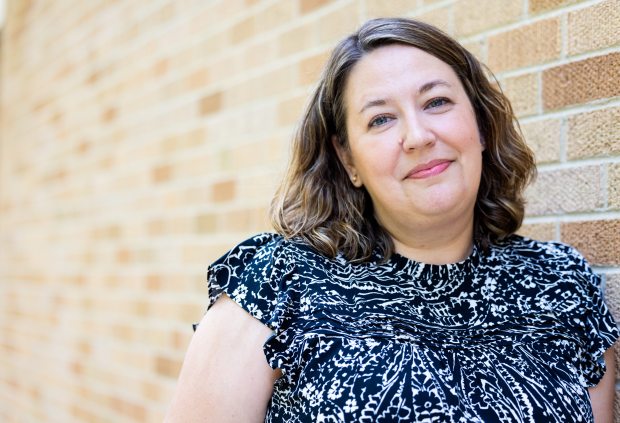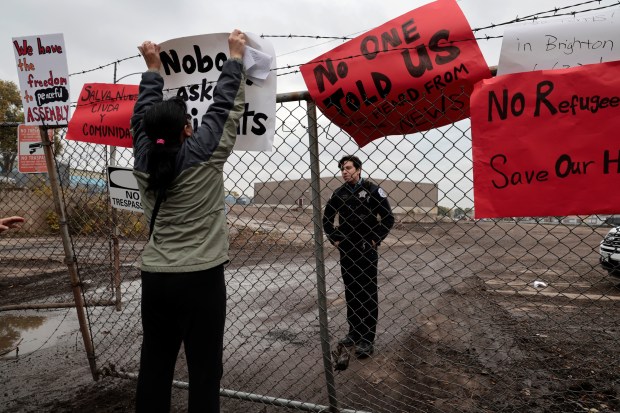I said it once upon a time when I was a working mom and I will declare it again from the sidelines as I watch this younger generation struggle: Child care is among the most demanding and frustrating parenting experiences.
Which is why I understood the angst in the voice of 34-year-old Naperville mom Yifan Sun, who is frustrated with hurdles she’s facing with her 3-year-old identical twins.
The problem: The little girls were expelled from two separate programs they started in August. The reason she was told in both cases: The school “does not have the resources to support the needs of your children.”
Translation: The girls were not adjusting to a structured setting. Issues, Sun said, include lack of focus, not listening to instructions or engaging in play, stiffening when becoming overwhelmed and disrupting nap times for others.
Sun, a data analyst, noted that neither program gave the family an adjustment period, nor offered ideas for her and husband Tyler, a physician’s assistant, who suddenly found themselves desperately seeking alternatives few and far between.
“Shouldn’t all options be explored? Shouldn’t there be more communication with parents before a note goes home saying your child is expelled?” she asked. “The fact schools can and do dismiss in such haste is concerning to me.”
Turns out there is a good chance these programs were not following a groundbreaking Illinois law that went into effect in 2018 which prohibits the expulsion of preschoolers from publicly-funded and licensed early childhood programs.
The law also requires programs to use all available resources to address a child’s behavioral needs before expulsion, and if a child cannot be retained, the providers must work with the family to create a transition plan to an alternative care setting.
One reason this law, considered the most aggressive of its kind, was put into place, is because data shows children “expelled at these young ages face more negative outcomes that impact them significantly later in life,” said Michelle Sands, associate professor of special and early education at Northern Illinois University.
“We want children to have a positive experience early in their education,” she said. “That is critical. We also want families to feel welcomed and to encourage participation in their education.”
It is an “equity issue,” she insisted, ”to give all children the opportunity to have a high-quality experience to prepare them for school.”
A 2021 report from University of Illinois Chicago researchers points to fewer children being expelled than before the passage of the 2018 law, but there remains confusion around it, and that preschool programs still find ways to exclude children under 5 for behavior issues.
Pre-kindergarten students are expelled at a rate more than three times that of children in grades K-12, with Black children almost twice as often and boys four times more likely, according to studies.
All those changes are hard on young children, especially those who need the most support, noted Sands.
That’s exactly the reason Sun wanted to take her experience public.
“It breaks my heart,” she said, noting her daughters still remember with fondness their first preschool teacher. “These are their formative years. How do you explain you are dismissed from a school for not sitting properly in circle time?”
Sun wants to make clear she is placing no blame on these preschool programs, and understands their dilemma, especially when staff shortages make it difficult to deal with special needs. And she also acknowledges the challenges her daughters present in these structured environments. Visits with multiple pediatricians indicate the girls are hitting all developmental milestones, but there are sensory and anxiety issues, which are in the process of being addressed with occupational therapy.
Assessments also noted the twins were at “minimal risk” of autism, yet Sun worries that puts them at risk of falling between the cracks.
“There’s nothing in between,” she insisted. “I know tremendous amounts of money are going into early education resources. There has to be a place for kids who have special needs but are not autistic.”
Still, Sun is encouraged Illinois is “leaps and bounds ahead of other states” when it comes to a commitment to early childhood education. In addition to the 2018 law to minimize preschool expulsions, Gov. J.B. Pritzker signed a bill in June creating the Department of Early Childhood, which is intended to unify three different agencies that had made it more challenging to navigate the pre-K system and often left gaps in services.
The goal, according to a press release, is to make it easier for parents to find quality care and education, no matter what their ZIP code.
While Sun remains frustrated and nervous about the future of her children, she is not giving up hope. The girls enrolled in a third program a couple weeks ago but are once more struggling and facing expulsion. While their mother feels “we are again at ground zero,” this time the school is working with the family to find ways to keep them in the classroom temporarily until another option can be found.
Sun has also reached out to what Sands describes as “one of the best resources” – local school districts.
Naperville District 203, she told me, will partner with the family on “a sustainable plan going forward” that will include assessments to see if the twins qualify for Individual Education Programs.
“We are gathering it all together,” said the cautiously optimistic mother.
All these moves are applauded by Sands,
“As parents we are often inundated with too much information,” she pointed out. “But it’s important to know that the state really is leaps and bounds ahead of all others when it comes to early childhood education.
”it just becomes a matter of who to ask and where to look.”
dcrosby@tribpub.com




